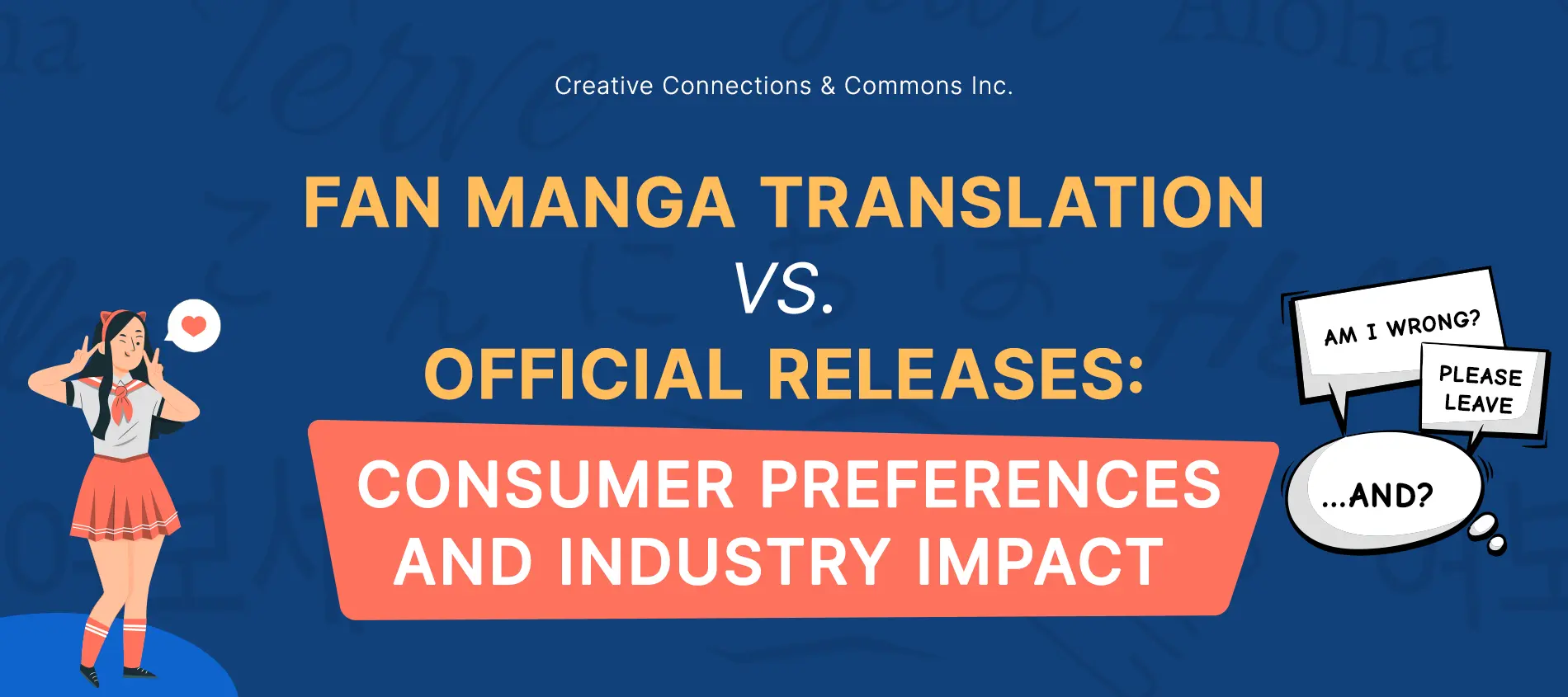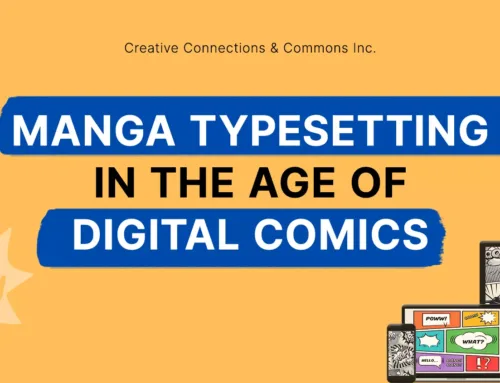Manga translation is vital in expanding Japanese media and culture. After all, the global demand for manga continues to rise. Moreover, researchers have identified this demand among the contributing factors to manga’s rapid growth in market size. Thus, translation service providers would bridge cultural divides.
Non-Japanese-speaking manga fans who want to enjoy the popular titles in Japan rely on translations. That’s where professional translation companies like CCC come in. Meanwhile, fellow fans also create independent translations to share amongst themselves. Read on as this blog explores how these two types of translation fare against each other.
Key takeaways:
- Manga translation is a multifaceted endeavor that requires linguistic expertise, cultural sensitivity, and an appreciation for the art form.
- Professional manga English translation and fan translation are two primary methods for people to consume manga outside Japan.
- Manga localization is an important element of translation to maintain faithfulness to the source material.
Table of contents:
- Understanding Manga Translation
- Fan Manga Translation: Pros and Cons
- Professional Manga Localization
- Manga Translation Trends
- Consumer Preferences: Fan vs. Official
- CCC: We Translate Japanese Manga to English Professionally
Understanding Manga Translation
Translating manga is the process of converting Japanese comics, webtoons, and graphic novels into other languages. English is the predominant target language for translation given its influence on global audiences. However, other languages may share nuances with the original Japanese works that may not translate well in English.
Accurately conveying the essence and nuances of the original manga is critical in cross-cultural exchange. Accordingly, manga localization is equally important to translators. This way, manga is accessible to a broader audience. At the same time, the translated work preserves cultural authenticity.
Ideally, anyone who would translate Japanese manga to English or any target language must be fluent in Japanese. Thorough comprehension of the original text ensures accurate translations. After all, translators must capture subtleties in meanings. Sometimes, translators and editors work with consultants to ensure cultural integrity.
Fan Manga Translation: Pros and Cons
Given the rise of manga translation trends due to global demand, dedicated manga enthusiasts have taken matters into their hands. These passionate communities produce fan translations of Japanese works that for other fans to experience.
Volunteers who are fans of the work they produce often make up these translation communities. Through their efforts, global audiences get to share in the enjoyment of Japanese fans. Still, this arrangement has some disadvantages. Here’s a closer look.
Benefits of Fan Translation
- Speed: Fan translations are often available shortly after a new chapter or volume is released in Japan. Meanwhile, official releases may take months or even years before reaching international audiences. Rapid turnarounds allow fans to keep up with their favorite series without waiting for official translations.
- Variety: Fan translations are diverse. On the one hand, official releases tend to lack variety because of market considerations or even publishing censors. On the other hand, fans are free to choose which titles they want to translate. Moreover, they can select titles regardless popularity or commercial viability. Thus, readers have a more extensive manga library available to them.
- Accessibility: Fans typically distribute their manga English translation freely online. Accordingly, they are available to anyone with an internet connection. This accessibility invites new readers and allows fans from around the world to connect and share their love for manga.
Drawbacks of Fan Translation
- Inconsistency: A challenge in manga translation that fan translators might face is poor quality control. Fan translators may not have undergone the rigorous training of their professional counterparts. At the same time, fan translation communities may have limited quality assurance processes given their voluntary resources. As a result, fan translations would lack consistency and accuracy. Thus, the final work could lead to misunderstandings or mistranslations, detracting from the reading experience.
- Legal and ethical concerns: Many cases of fan translations operate in legal gray areas. At its core, fan manga translation involves translating and distributing copyrighted material without authorization from the original creators and publishers. Accordingly, intellectual property rights and fair compensation for creators come into play.
- Industrial impact: Creators could lose potential revenue despite the exposure from unofficial translations. Similarly, these works can undermine the manga industry’s financial viability as fans don’t purchase official releases. In turn, the lack of market data may discourage publishers from investing into manga. Likewise, the reluctancy would discourage creators from producing new work.
Professional Manga Localization
Professional manga translation services includes localization in their official releases. This service ensures that translated manga titles reach global markets as authentically as possible. Unlike fan translations, professional translations involve people with formal training and oversight.
In addition, linguists can be involved in quality assurance processes. Along with the translators and editors, they would ensure the accuracy and consistency in the final work. After all, preserving the integrity of the original work allows global audiences to enjoy the manga as its creator intended.
Note: Some professionals may participate in fan translations out of passion for the medium. However, their participation would appear as condoning copyright infringement. Additionally, their involvement in unofficial translations may conflict with their professional obligations and commitments to maintaining quality and accuracy.
Manga Translation Trends
Several key trends impact how professional translate and localize manga for global audiences.
1. Digital Shift
Transitioning from physical to digital consumption, manga is now readily accessible via digital platforms and mobile apps. This shift has prompted publishers to adapt their localization strategies to cater to digital readers’ preferences.
2. Transmedia Adaptations
Manga’s integration into various media forms, including anime and video games, presents both challenges and opportunities for localization. Translators must maintain consistency across different mediums while tailoring the text to suit each platform’s unique characteristics.
3. Webtoons and Mobile Comics
The rise of webtoons, designed for mobile devices, revolutionized manga consumption. Translators must adjust their localization techniques to accommodate the scrolling format and interactive features of webtoons. Accordingly, they ensure an optimal reading experience.
4. Content Diversification
To meet diverse reader interests, manga content has diversified, embracing LGBTQ+ representation and niche genres. Translators play a crucial role in preserving the authenticity of diverse narratives while making them accessible to a global audience.
5. Global Collaborations
Increasing collaborations between Japanese manga creators and international partners enrich the manga landscape with diverse storytelling. Translators involved in these collaborations navigate cultural and linguistic differences to maintain the integrity of the original work.
Consumer Preferences: Fan vs. Official
Different factors influence reader preferences:
- Quality: Readers value translations that accurately capture the original intent and nuances of the manga.
- Availability: Readers often gravitate towards translations that are easily accessible and timely.
- Price: Some readers are willing to pay for official releases to support creators and ensure a high-quality product.
Pro tip: The choices of manga consumers have a direct impact on industry revenue and the sustainability of the manga ecosystem. When readers opt for official releases, it translates to direct support for creators and publishers. This support contributes to the industry’s financial viability. Conversely, a preference for fan translations can undercut official sales, potentially leading to revenue losses for creators and publishers.
CCC: We Translate Japanese Manga to English Professionally
Fan and professional manga translation have a common goal of sharing the art with non-Japanese-speaking audiences. While fan work has its benefits, official releases guarantee professional involvement.
At CCC, we combine the passion of fan translation with the resources of professional localization. With translation and manga typesetting services, our team effectively converts cultural nuances and manga storytelling conventions into target languages. Contact us now!





